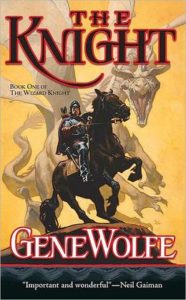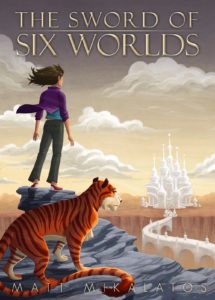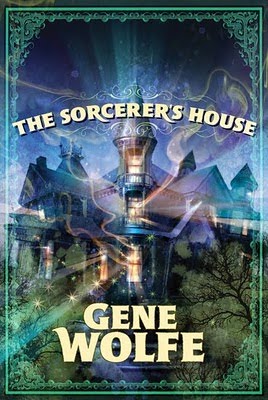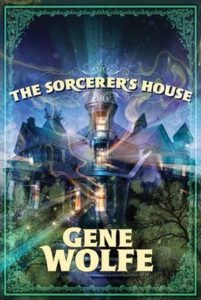A Brief Introduction To Gene Wolfe, My Favorite Contemporary Author
 I’m not going to lie. I understand why my favorite science fiction author isn’t a household name. But I think he should be among Christian fans of speculative fiction.
I’m not going to lie. I understand why my favorite science fiction author isn’t a household name. But I think he should be among Christian fans of speculative fiction.
Gene Wolfe, a devout Catholic, wrote the Book of the New Sun, a science fantasy tetralogy (currently packaged as Shadow and Claw and Sword and Citadel) which explores themes of transformation, resurrection, re-creation, identity, humanity’s relationship to God and God’s plan to save humanity. It’s beautifully written, imaginative, entertaining and devoutly, in-your-face, gorgeously Christian. The individual books in the tetralogy won the BSFA award for best novel, the Locus award for best novel, a Hugo award, the August Derleth award and the Campbell Memorial award for best novel. Some of the greatest writers in the world of speculative fiction have lavished Wolfe with praise, and he’s recently been awarded the title of SFWA Grand Master.
I won’t give away too much, but here’s a little taste of some of the Christian themes … there’s an ancient God called the Increate (the uncreated one) who sent a representative called the Conciliator to Earth to prepare humanity for the coming of the New Sun. It’s a million years in our future, and our current sun is about to die. A young man from the torturer’s guild sets out on a journey during which he finds an artifact of God’s ambassador … the Claw of the Conciliator. He then seeks out his destiny. To rule the world? To save it? Is he the Conciliator? Or someone else? And who will bring the new sun? It’s an amazing science fantasy.
Having said that, Wolfe can be frustrating. He likes to use unreliable narrators. He makes obscure references, linguistic, historical, and literary, and expects his readers to keep up. He often has key action scenes take place “off stage.” I’ve finished some of his books (like An Evil Guest) and had no idea what I just read. I could tell something deep and important was going on, but felt like a five year old sitting at the dinner table listening to the adults talk about politics. The beautiful writing carried me to the end, but I still had no idea what happened. His recent novel, The Sorcerer’s House, reveals at a certain point that the reader could reconstruct the novel in another order if they chose, a complicated invitation to a puzzle that delights some readers and frustrates others. It’s the sort of writing that allows for scholastic exploration and debate.
I know this is the frustration people have when I try to convince them to read a four novel series as an “introduction” to Wolfe. It requires patience and hard work and working through moments of confusion. The patience pays off with dazzling moments of pure joy, but I understand that four books is a lot to ask. So I thought I would list a few of Wolfe’s more overtly spiritual shorter works. This isn’t comprehensive. I list these in the hope that you’ll read one, love it, and then read everything Wolfe has written.
Perhaps the easiest thing would be to point you to the recent The Best of Gene Wolfe: A Definitive Retrospective of His Finest Short Fiction. Here are four stories from that book:
- “La Befana.” An old woman comes to a hostile planet in search of redemption for her sins, committed long, long ago.
- “Westwind.” A chance encounter reveals two people, deeply connected to God through technological means.
- “Bed and Breakfast.” A man spends the night in a bed and breakfast near Hell, and crosses paths with both a demon and a fugitive from Hell. Is this all part of a plot to ensnare him? Mirtika [Schultz, one of the founding contributors] has blogged about this one here on Spec Faith.
- “And When They Appear.” A dark (this one is pretty disturbing) Christmas ghost story about faith, innocence, family, and the loss of all three.
 If you’d like to try a novel, but don’t want to start with the New Sun books, the one book I’ve found a wide variety of people to enjoy is Pirate Freedom. The speculative element is slight … it’s mostly a fun and painstakingly accurate pirate novel. The Wizard Knight duology [Book One, The Knight] is fun and accessible as well.
If you’d like to try a novel, but don’t want to start with the New Sun books, the one book I’ve found a wide variety of people to enjoy is Pirate Freedom. The speculative element is slight … it’s mostly a fun and painstakingly accurate pirate novel. The Wizard Knight duology [Book One, The Knight] is fun and accessible as well.
If you love speculative fiction, either as reader or writer, Wolfe is worth your time. If you’re a Christian wanting to improve the quality of the books you’re reading or improve your craft as a writer, Wolfe is essential.
I’ll be sure to hang out in the comments to answer questions about Wolfe and his work. I’ve read all the novels but one, and all the collected stories … I’ve missed a few uncollected works, I’m sure. He’s the sort of author whose work rewards multiple re-readings.
Clearly, I am a fan of Wolfe and I hope you will become one, if you aren’t already. For those Wolfe fans already out there, would you list different entry points into Wolfe’s work? Which is your favorite novel (or cycle of novels)?
———-
 Matt Mikalatos is, most recently, the author of the fantasy novel The Sword of Six Worlds as well as the ridiculous comedy theology novels My Imaginary Jesus and Night of the Living Dead Christian. Feel free to follow him on Twitter or visit his blog. You can also check out his podcast, the Storymen (most recently interviewing Julliana Baggott, author of post-apocalyptic/dystopian novel Pure).
Matt Mikalatos is, most recently, the author of the fantasy novel The Sword of Six Worlds as well as the ridiculous comedy theology novels My Imaginary Jesus and Night of the Living Dead Christian. Feel free to follow him on Twitter or visit his blog. You can also check out his podcast, the Storymen (most recently interviewing Julliana Baggott, author of post-apocalyptic/dystopian novel Pure).












































Last summer, I read The Knight. Gene Wolfe is truly a skilled mythopoet; he really embodies the Norse concept of a “middle earth,” as well as a fascinating portrayal of eternity. There are some weird things in The Knight that seemed bizarre and unsettling to me, and I’m not really talking about the high literary meanderings. Still, I’m looking forward to reading The Wizard when I get around to it.
Ooops. I should have mentioned that in the article above, Bainespal, thank you for saying that. If you’re thinking of the part I’m thinking of, there is a disturbing scene related to fantasy creatures and sexual relations with human beings, explaining the common mythology of people who are, for instance, “half giant.” Wolfe doesn’t shy away from the logical conclusions forced on his fantasy worlds. Also weird: it seemed like they tried to market this book as YA and it certainly is NOT YA in tone or content. Maybe the publisher was trying to cash in on the YA craze. Not sure about that.
The Book of the New Sun has weird moments, but nothing quite as unsettling as that scene in the Knight.
This sounds very much like Charles Williams (who’s still one of my favorite authors, and one of whose books I still include in my list of “books everyone ought to read”), only perhaps not quite as bad …
(Wolfe has been on my “to-find-and-read-one-of-these-days” list for a while now, but that list is a very long one, I’m afraid.)
Wolfe is less likely to go for overt philosophy lessons in the midst of his books than Williams, but he’s very comfortable with having a book with a meandering plot and plenty of times when the action stops or even goes backwards, which reminds me of Williams at times. I really loved “All Hallows Eve” and “Place of the Lion.” Which are your favorite Williams books?
I’ve only read Place of the Lion, but I feel like I’d understand Williams more if I read more of him
Of the novels, probably The Greater Trumps, War in Heaven (despite how difficult it gets to even tell what’s going on at one point), or Descent into Hell (for his ideas about “bearing one another’s burdens” if nothing else). But I’m particularly fond of Taliessin Through Logres and The Region of the Summer Stars. And I quite liked The Descent of the Dove.
I have never even seen those last three. I’ll have to look them up!
OK, I’ll just say it, Matt. After reading your post and then these comments, I’m not sure why I should read any of Wolfe’s stuff. I mean, do I really read a story because I like being confused . . . at the end? No. Or do I want to read disturbing beastiality sex stuff? No again. Do I want meandering tales with obscure linguistic, historical, or literary references? No again.
In other words, as much as I respect your opinion (which is a lot), I’m just not seeing it. What makes these “essential”?
Becky
Perhaps if the chief end of reading stories (as with anything else man does) is “to glorify God and enjoy Him forever,” one could enjoy Wolfe’s negative elements as a contrast to Biblical beauty and truth? I’m not sure, however, whether he casts such elements in that light or else enjoys the Grittiness of them — a flawed “art for its own sake” argument — because so far, I haven’t read any of Wolfe’s work.
I think I’ve somehow set us down the path of emphasizing “negative elements” that are neither as common nor as clear as would appear to be the case from this thread. If one were to start with “La Befana” or “Westwind” I don’t think anyone would be confused, be offended or think that Wolfe’s works were gritty at all. 🙂
Bestiality is part of the human condition, so while I really don’t want a blow-by-blow of it (ick), I see no problem with a novel having it, especially if it’s related to the situation of a fantasy world. I mean, let’s say the reason we have Centaurs is that a human and a deity in horse form got it on? That’s legitimate for a fantasy world/myth world explanation. I read Greek myths as a kid, and Zeus was changing into a swan or cow to do his naughty business. It’s part of our literary heritage in the Western world, frankly. Like anything, it’s in the handling.
Just censoring it outright, well, then no Christian writer dare have any sin depicted in any book. We then ought not have theft, murder, gluttony, gossip, blasphemy, usury, idolatry, or any multitude of sins in a book. Sexual sin, including bestiality, is just part of what is fallen and misdirected in our world. And yes, people are having sex with sheep and goats and horses and dogs even as I type. I have no blinders on about that. But in a novel situation, it can certainly be a legitimate reality in that fantasy or science fiction milieu (in that case, it might be a human and an alien that is not specifically limited to humanoid in configuration).
One reads writers like Wolfe the way one reads Hemingway or Woolf or Steinbeck or Welty or Updike or any other highly esteemed writer in a field: Because he’s one of the best out there. Because his craft is impeccable. Because he’s a writer’s writer and a writer can learn from it. For readers–many of whom vote him one of the giants of SF–it’s for diversion or mental stimulation or whatever other reason a reader reads SF. 😀
Just to clarify, I can’t remember any true bestiality anywhere in Wolfe. The event in question is between a race of (sentient) giants and humans. I feel like I haven’t been super clear on multiple topics here. 🙂
Hey Becky —
The Book of the New Sun is not so much confusing as rambling and slow to unfold. The answers are all there, but Wolfe expects you to pay attention. He doesn’t spell it all out. I mentioned below, but will reiterate here, there’s no straight-out bestiality in Wolfe, the disturbing incident in question in The Knight is between a race of giants and humans.
That’s part of why I suggested the short stories to start. You can see Wolfe’s craft (which is exceptional) as well as the breadth of ideas and the spiritual underpinnings of his work.
A lot of the obscure language and things are used much the way other writers use their own self-coined neologisms… in that sense they give more clues to the world around the reader than a lot of fantasies.
I think writers of speculative fiction should read Wolfe to see writing of LITERARY quality using genre to express itself. Wolfe is highly respected. His use of unreliable narrator brilliant.
There are folks who don’t read Ezekiel, for example, because they find it perplexing and confusing and weird. But God put it in the Bible, right? haha Well, if one is a lover of speculative fiction, and if one wants to see a writer of high calibre with a Christian worldview (Mr. Wolfe is a Catholic) who is highly respected in a genre where being Christian is kinda snidely looked down upon –in other words, he’s an ANOMALY in secular SF–then this is one to go to.
It’s about craft. And let’s face it, craft needs work in the CSF area. We can learn a lot from Mr. W. He’s got more than one novel in the list of 100 Best Science Fiction Novels and he’s won a boatload of awards. Locus magazine once ranked the Book of the New Sun as the THIRD best fantasy work pre 1990. Writers such as LeGuin and Gaiman praise him in extraordinary terms.
IMO, if a person is wanting to learn the craft of writing for a particular genre, you look for those most respected in that genre, most award-winning, most lauded by peers. Mr. Wolfe qualifies for fantasists/SFers.
I still love Bed and Breakfast and reread it on occasion. Thanks for linking to that years-old blog post of mine. 😀
Mir, I actually remembered that post when I was writing mine and went digging around to find it. I agree with you that Wolfe is an amazing master at craft. I’ve read several of his stories and put them down, shaking my head and asking, “How did he do that?”
I particularly love the one in the bookstore, with the man who finds the phrasebook from another world. I couldn’t remember the name and I’m traveling right now. Do you know that one, Mir?
Here ya go. “Useful Phrases”
http://books.google.com/books?id=STfRpCueLC0C&pg=PA239&lpg=PA239&dq=Gene+Wolfe+Useful+Phrases&source=bl&ots=r7xI9qu6ri&sig=7xuKIKlNnmGvzbDyNtmAzMgStfU&hl=en&sa=X&ei=7fFDUbKvBtWp4APEsYHABA&ved=0CEMQ6AEwAg#v=onepage&q=Gene%20Wolfe%20Useful%20Phrases&f=false
YES! Thanks.
I’ve read the Book of the Long Sun, and some of his short fiction. He is good, but like you said he’s dense, and a lot of Christians don’t really seem to read spec fic deeply enough to be comfortable with that kind of writing. It’s like the difference between mainstream fiction and literary fiction, and literary SF is kind of out of favor in the modern market. It’s a lot of bubblegum and blasters these days, or genre-of-the-month stuff like bizarro, slipstream, and witpunk.
While I agree that for the writer it’s good to read him as well as others, this site is also targeted towards the reader, and it’s a harder case to sell him. Each reader has their own comfort or tolerance level, and going past that can lead to things you’d rather unsee and maybe even spiritual harm. I think most people know their tolerance levels. The guys who read Neil Gaiman should read him by all means, and those that don’t trust the secular market would probably get turned off by Gene.
I agree Wolfe is a harder sell. You’re right, also, that those who don’t enjoy secular spec fic at all will likely dislike Wolfe. Gaiman’s work has never really connected with me. I couldn’t force myself to the end of American Gods for some reason.
Did you feel, D.M., that there was anything particularly harmful or offensive in the Long Sun books? I couldn’t remember anything.
I love NEVERWHERE and THE CEMETERY BOOK (his “reimagination” of the Jungle Book) from Gaiman. The idea of this other world (whether under London or the dead and undead in the Cemetery functioning as a cohesive society with good and bad elements) appeals to me when done with a good voice. I like Gaiman’s voice, the darkness and the humor combined, the “Britishness” of it, the way I loved the Britishness of Monty Python and Doug Adams. I tend to prefer his short fiction, but those two novels I just found myself totally immersed and delighted by. Neverwhere is what turned me into an urban fantasy lover…
Ha. Those are two of his books I haven’t even tried. I read the whole Sandman cycle, half of American Gods and a few short stories. I’ve debated picking up the Cemetery Book now and again. Maybe I’ll give it a shot.
Gaiman is brilliant. Ever since he wrote a Doctor Who episode for season six (yes, it always comes back to Who ) I’ve read everything of his that I could find–Neverwhere (which BBC Radio 4 extra is airing as a radio drama now), American Gods, Ansani Boys, Coraline, Sandman, MirrorMask….yeah, I love his tone and mythic qualities
I love the mythic bits and there are moments when his work is like reading beautifully redone myths, but there’s something about the emotional resolution that doesn’t ring true to me. Not sure what it is, and it’s one of those things I end up scratching my head over, trying to figure out what I’m missing. Maybe it’s because he’s a Brit. 🙂
There was one scene where Silk is asked to use a weapon in a manner not intended by the manufacturers by a certain person he is robbing, but beyond that I don’t remember. The whole “needing to be comfy with evil” might be a little bit much for some people. If I recall, Silk had to deal with some nasty characters.
I just mentioned Gaiman because some people here are likely to have read him. I’m not big on him myself, not my taste.
I’ve read the first two books of Wolfe’s Book of the New Sun, but I had to force myself to finish them and I did not feel the need to continue with the quartet. I felt like he was being obscure and cryptic for far too much of the text and constantly trying to confuse the reader. I’ve enjoyed several of Charles Williams’ novels, and there’s no comparison. With Williams, I at least have some understanding of plot, even if the mechanics are obscure (particularly in Place of the Lion, much less so in Descent into Hell). With Wolfe, I’m doing well to understand a given scene, if that much. He doesn’t seem to want his readers to understand the text. That’s a failure on his part. Perhaps the Book as a whole is a great work, but the individual ones are not that great, and as Becky said, the fact that he’s trying to confuse me that much makes me not want to read him. I realize that not all fiction has to be fully understood on the first read (in fact, it’s likely weak if you do), I still expect to have at least a basic understanding of it on the first read. With Wolfe, I don’t have that.
Hey Shastastwin–
I feel almost identically about your response as I do when people tell me they don’t like Tolkien because of all the songs and mythology… that’s part of why I love it, so it’s hard to say anything other than that we have different tastes (I’m assuming you love Tolkien, I’m just saying that it’s sort of the same thing for me).
One thing I would say is that I don’t think Wolfe is trying to confuse anyone. He would say the answers are all in the text, and in my experience so far, that’s the case. It’s probably why the short stories are a better place to start: they’re more accessible, still beautifully done, and one learns to trust him as an author (that he has a point, that the plot makes sense, that the story will resolve). I find with many of Wolfe’s novels I enjoy them more each time I read them… my second read through of New Sun moved it from pretty good to a favorite. For me, the patience pays off in the end (not saying that would be, should be or is the case for others).
You and Becky both mentioned not wanting to be confused by books you are reading, and I’m with you. Like I said above, Wolfe is frustrating sometimes. I got to the end of “Home Fires” and felt confused, but I know if I dig back in I’ll get more out of it. And in the meantime there are these beautiful moments I still walk away with. Here’s one:
Likewise, “An Evil Guest.” I understood that it’s a Lovecraftian tale about Chthulu wakening and its effect on the world, and I caught that somehow there’s an incarnation of the pulp hero The Shadow involved in the war, so at that level it was entertaining, but I know there’s something more going on, I just don’t know what. So yeah, that’s frustrating. But also sort of fun, because I know I can go back and enjoy it more deeply as pieces of the puzzle start coming together.
I would agree with you there, and I realize my objections seem to be along the same lines. I was recommended to the New Sun by a friend who thought it was one of the best sci-fi books ever. I didn’t see the appeal because I was having to force myself to go on, thinking maybe Wolfe would explain or reveal something to make it all sensible. My understanding is that he does this to an extent in the second half of the quartet, but (as a reader) I don’t trust him because he doesn’t give me a frame of reference.
I disagree, but we’ve established that already.
See, that’s part of my issue. These books (New Sun) seem to require multiple readings just to get the basics. I don’t like that in fiction. I want to be drawn back to a book for multiple readings, the way Narnia, LotR, Harry Potter, and other books draw me back. I want to feel invited to peel back the layers of the text, not forced into it. I feel like Wolfe is forcing me to do it, not inviting me.
I’ll give some of his short stories a try, and I may go back and finish New Sun at some point. It’s funny that you compare the experience to reading Tolkien, because I don’t get the same feeling reading the two. With Tolkien, I feel there’s more beneath the surface, but the surface is satisfying on its own. With Wolfe, the surface level of the text is not satisfying and doesn’t invite me to find out what deeper levels there are.
I’ll be honest, I’ve heard and read a lot of people complimenting and praising Wolfe, but he hasn’t impressed me. There were not a lot of places in the first half of New Sun where I was awed by his writing, much less his storytelling. I wish I could say the opposite, because I feel now that I’ve missed something. I’d previously thought that it was those who thought his books were good that were misguided. Now, I think maybe I am on some level. But I still don’t understand why these books are considered so great, especially on an individual level (because, as you pointed out, they won awards as separate novels).
Okay, after reading over “Useful Phrases” (or what of it was available at the link above; the last three pages weren’t included), I can see why Wolfe is both popular and masterful. His writing there reminds me of why I love Jorge Luis Borges: the inventiveness of the character and plot and the skill of the sentences are great and make me want to read more. Not at all my experience with New Sun, and maybe enough to get me to try the last half of New Sun.
Wolfe loves Borges (I do, too!) and there are certainly places where he’s dealing with Borgesian labyrinths in his writing… sometimes to advance the plot, and sometimes just for the sake of interesting window dressing or for the fun of solving a puzzle.
There are a lot of references to Borges and his work in New Sun, and some people think that the librarian Ultan in New Sun is meant to be him! Sometimes it felt to me like the settings were a pastiche/homage to Borges’s invented worlds (note the libraries, for instance, which by the end of the New Sun have grown to be much like Borges’s Library of Babel).
And, for sure, you see things like this:
You may not have missed anything, honestly. The tastes and preferences of the reader play in, and I’m sure we’ve all had the experience of trying to convince someone who hates fantasy novels that they should love them, but nothing seems to stick for them (though I’ve found “The Once and Future King” to be a good one for the anti-fantasist). As for me, I mildly dislike Jane Austen, actively dislike the Brontes and have a physical reaction of loathing to Faulkner. It doesn’t mean they aren’t great writers or that I’m a terrible reader, I think it’s largely a matter of taste and preference. I don’t think there’s a magic key that someone can provide so that I enjoy Faulkner. At least I hope not. 🙂
I do think part of the reason Wolfe’s books were lauded early on, before the series completed, was that he was already well-respected and loved by professionals in the SFF fields by the time those books came out. They already had some knowledge of how to read Wolfe, what to be looking for, and trusted him as an author (as you mention above, I do think trust is key for a novelist like Wolfe… you have to be able to assume that he knows what he’s doing and that it’s leading somewhere worthwhile… without that trust it’s easy to give up, and understandable and even praiseworthy to set it aside).
Thanks for that. It’s encouraging to read.
Are there any story collections you would recommend to start with? “Useful Phrases” makes me think I’d like to try some of his stories before seeing if I can try New Sun again.
(By the way, I enjoy both Austen and Charlotte Bronte, but haven’t had much experience with Faulkner or the other Brontes. Since we are comparing literary tastes. 🙂 )
I suppose the easiest thing is to read “The Best of Gene Wolfe” collection which came out a couple years ago. There will be a few stories you may dislike in there, and a few you enjoy, but it will give you a good idea of whether you want more.
His first collection, “The Island of Doctor Death and Other Stories and Other Stories” might be a good place to start. I wonder if Marc would think so, too?
“Useful Phrases” came out of a book called “Strange Travelers” which has several stories I enjoy: No Planets Strike, Bed and Breakfast, To The Seventh. For some reason, though, this collection has an above average amount of sex and violence compared to most of Wolfe’s work, so be aware of that.
Yes, The Island of Doctor Death and Other Stories has some of his most compelling work, but it isn’t the “easiest”. The adventure elements of New Sun make it the most successful mainstream story, where “cool stuff” happens whether you get it or not, but his short fiction in the collections Starwater Stains, Innocents Aboard, or Castle of Days is “easier” than the fiction in IoDDaos, Strange Travellers (which is very cryptic as a whole) and Endangered Species. I say New Sun and any collection except Strange Travellers is a good starting point. Can’t really go wrong with The Best of Gene Wolfe, I suppose, with the knowledge that some of those works are going to be a bit difficult on the first read.
If you love Herodotus and myth, do the Latro books, but they are not by any stretch that accessible, but they have a lot of framing reference points for a historically/mythically knowledgable person.
Likewise, “An Evil Guest.” I understood that it’s a Lovecraftian tale about Chthulu wakening and its effect on the world, and I caught that somehow there’s an incarnation of the pulp hero The Shadow involved in the war, so at that level it was entertaining, but I know there’s something more going on, I just don’t know what. So yeah, that’s frustrating. But also sort of fun, because I know I can go back and enjoy it more deeply as pieces of the puzzle start coming together.
Is that one of his short stories or a novel? I saw Cthulu and The Shadow (My favorite pulp hero) in the same paragraph, and I need to track that down then.
It’s a novel. Here’s a link: An Evil Guest.
It’s a novel. Here’s a link.
Thank you!
Wolfe is a sublime artist, and the greatest author I have ever read. So many people who write with a spiritual or faithful perspective are either divorced from reality or oversimplify – Wolfe’s work is challenging but highly structured, as is the real world. The elided bits often point somewhere that can be rigorously deduced.
My caveat to recommending Wolfe to those used to banal oversimplifications of faith is that he is complicated, and his engineering background makes the construction kind of gnostically sealed from real intervention.
Take the “divine” enlightenment of Silk in Long Sun (spoilers, but not really) – it’s (kind of) pretty clear when you look at the dream sections of the text and what happens later that this good man is the planted love child of the most satanic figure in New Sun, Typhon, with his mistress Kypris. He is the child Typhon wants to replace him, and that enlightenment he experiences has two voices, the male and female, whispering in his ear . As a grown embryo, the message had been planted in him with physical means by his father and mother (who is also Mamelta with her blue eyes and black hair). This realization, and Hyacinth’s tryst with Saba, lead him to contemplate suicide … and he actually does probably commit it later, when Horn’s spirit is used to save him in Short Sun by “rebooting” him. His spiritual message is extremely tricky. There are other very sinister implications of the New Sun coming, and we should always keep in mind the Chanticleer story in New Sun – that even the angels and amschaspands are infinitely remote from the Increate, though they are far above man. Pas has stolen the identity of the Outsider, but in so doing they all serve a purpose.
He is a symbolist on the level of Melville, and should be infinitely important to art, as he really is a genius. I’ve never been more rewarded than by sitting there and actually pondering over the minutia of a text.
I think his complicated understanding of faith and the universe is part of why I love him. Silk most likely comes from evil beginnings but he’s simultaneously a good man, probably a saint, who seeks salvation for himself and his people with dogged determinism.
Also, if you understand the Long Sun cycle to be about the transformation of a pagan religious and governmental system into a monotheistic one, it’s a pretty fascinating historical and theological arc that the books take.
I agree… part of the beauty of Wolfe is that you never have to leave a given work. You can go back to it multiple times and pull more out of it. The effect of the New Sun’s arrival, for instance, makes one wonder whether Severian is Christ or a type of Christ (Noahic probably), and I know debates abound on whether the coming of the New Sun is a positive or negative event for humanity.
Melville is probably the perfect analog for Wolfe. Everything he does, symbolically and story-wise, is done with an exact purpose, even when it occasionally frustrates the reader.
Marc, I’m curious what your favorite Wolfe works are?
My favorites are definitely Short Sun and the Latro Books, followed by Peace, New Sun, and Fifth Head of Cerberus wow, talk about negative religious imagery in that one!!! some of the street names imply corruption, maggots, being a mountebank, the house number 666, etc) . His short fiction is brilliant; I love the collections The Island of Doctor Death and Other Stories and Other Stories, as well as Endangered Species.
As far as individual stories, Trip, Trap, The Changeling, Suzanne Delage, In the ginger bread house, Seven American Nights, and Westwind are pretty awesome, and from his later work, probably From the Cradle. I think there usually is a thematic “solution” to most of the mysteries.
For example, in Trip, Trap the two individuals put aside their subjective understandings and come to an objective “real” sprititual communion that creates the third billy goat to kill the troll under the bridge (the sword is broken in the spirit world, so there are no piercing wounds on the body because that is MORE real than their individual subjective realities). In The Changeling, paying attention to when the unaging boy shows up (when the girl Maria is a child) leads us to understand why Pete Palmer isn’t in the 4th grade year book picture – he was born in 1931 instead of his erroneous mind altered assumption of 1934. There is also external evidence to corroborate this: the actor Pete Palmer who played Lil Abner was born in 1931, as was Gene Wolfe. Lil Abner was a notorious oaf, and the origin of that word implies a changeling … so our narrator was actually switched in 1931 and wrestling his changeling in 1944 or so altered his memories. So many awesome features to almost every Wolfe story when you sit down and approach it systematically; amazing.
I’ve been giving Peace sidelong glances on my shelf for a while. That one and Free Live Free have been basically inscrutable to me. I understand that Peace is a ghost story, but it didn’t do much for me. I’ve been debating trying again. I got Free Live Free as a re-tread of Oz, but that’s about all I got out of it. The one book of Wolfe’s I disliked completely was Pandora by Holly Hollander. I think I might have even gotten rid of it.
I wish the story collections came out faster! I have a copy of Memorare from F and SF, which I absolutely loved, but I know there are probably a few stories lurking out there that I haven’t read.
I’ve always wanted to drop Wolfe a note because his works have meant so much to me, but I’m intimidated by him, frankly. I’m guessing he doesn’t have all that many books left in him, which makes me sad, but then again I know I can re-read most of his books with a lot of joy.
Peace is another sublime book. In this one, the parallel structures come to the fore – colors in embedded stories map back to characters and their interactions and motivations; it is a pretty sinister book. I feel this is where Wolfe mastered his symbolic and parallel constructive style – common themes in the stories characters tell relate back to what is actually going on in their own lives. It is probably his greatest stand alone work. Sorcerer’s House and Home Fires are more “fun” but Peace is on another level. Wolfe’s dominant theme is always memory and identity, even in recent works.
The first person sections of Home Fires also meditate on identity – where did a lawyer learn how to fight effectively,, even as early as Chelle first returning to see him in the crowd? Despite his joke, it wasn’t law school, and the meditation on the strangeness of waking up the same old person is probably a mask for something else that has been submerged in our narrator and hidden in plain site – thus the need for him to join the military at the end.
You should try to contact him – he is a very wonderful guy, much more approachable than his books, in my opinion.
Matt,
I’ve been wanting to read Gene Wolfe for many years. I finally read Pirate Freedom and post a review on my blog:
http://kammbia1.wordpress.com/2013/03/08/book-review-36-pirate-freedom-by-gene-wolfe/
I understand that Pirate Freedom is one of Wolfe’s more straightforward novels with a somewhat reliable narrator. As you will read in my review, I felt it was more closer to a Robert Louis Stevenson novel than the science fantasies he is known for.
I thought it was engaging and readable…but could tell it was not his best work. However, Pirate Freedom is a keeper on my bookshelf.
I’m going to try Book of the Long Sun series and There are Doors as my next Wolfe novels. The Book of The Long Sun intrigues me a lot and I’ve read Nightside of the Long Sun and liked it.
Marion
I enjoyed Pirate Freedom and it’s a book I’ve had better success recommending to others. My mom liked it even! I’m told you can have a more traditional “Wolfe experience” by reading it and counting how many time travelers you can spot. 🙂
[…] Faith recently had an article where one author, to my delighted surprise, talked about his love for Gene Wolfe’s novels. This was good, because a lot of Christian spec-fic talk tends to only reference Tolkien and Lewis. […]
[…] A brief introduction to Gene Wolfe, my favorite contemporary authorSpeculative Faith […]